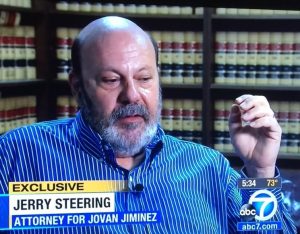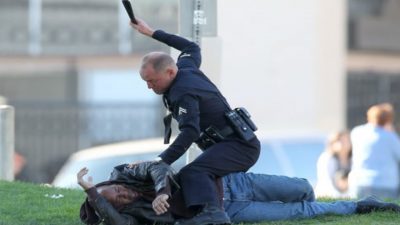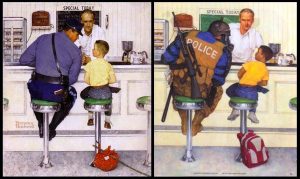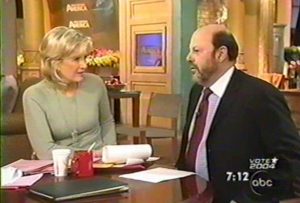![Mr. Steering interviewed about Jovan Jimenez case]() GARDEN GROVE FALSE ARREST ATTORNEY
GARDEN GROVE FALSE ARREST ATTORNEY
Jerry L. Steering is a Police Misconduct Attorney who sues police officers and deputy sheriffs, for, among  other things, false arrests, which are arrests of persons, in the absence of either an arrest warrant, or probable cause to believe that the arrested person committed a crime.
other things, false arrests, which are arrests of persons, in the absence of either an arrest warrant, or probable cause to believe that the arrested person committed a crime.
Mr. Steering’s office serves Garden Grove and all OC cities. Mr. Steering has been defending bogus criminal cases brought by police agencies in OC Superior Court since 1986. He has also obtained monetary awards and settlements in many police misconduct civil rights cases against OC cities, such as the City of Garden Grove.
THE GARDEN GROVE POLICE DEPARTMENT IS OUT OF CONTROL.
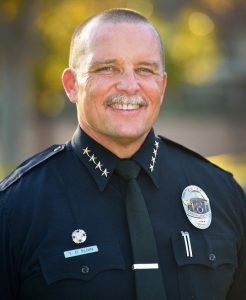
Photo by Steven Georges/Behind the Badge OC
What would have been deemed to be unreasonable and outrageous conduct by police officers 30 years ago, is now considered both reasonable and constitutional. Thirty years ago if a police officer pointed their revolver at your head and ordered you to prone yourself down on the ground, you were considered to be “under arrest”, and in order to make that seizure of the person lawful the police needed not only a warrant pr “probable cause” for your arrest, you also had to be suspected of a truly dangerous crime.
These days police officer “detain” persons in that manner for suspicion of just about anything. “Officer Safety” has replaced “probable cause” in Fourth Amendment jurisprudence. No where is that more evident than in Garden Grove, California.
For example, in Santos v. City of Garden Grove, et al.; U.S. District Court(2009) Mr. Steering obtained a $475,000.00 settlement from the City of Garden Grove for the false arrests and use of excessive force on several members of the Frank Santos family. See, Garden Grove Pays Half a Million to Settle
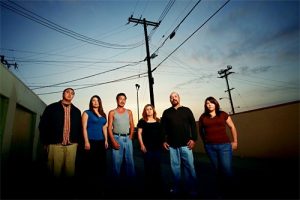
Brutality Suit With Santos Family , OC Weekly, September 30, 2009. Several members of the Frank Santos family were brutalized and arrested at the birthday party for one of Frank and Gloria Santos’ daughters. Frank Santos’ brother-in-law’s truck was towed away from a closed shopping center parking lot around midnight.. When Mr. Santos’ brother-in-law noticed that his car was gone and saw a tow truck race away with his car, the brother-in-law called Garden Grove PD to see if someone had called in a tow of his vehicle. Frank Santos’ brother-in-law also happened to be a CHP officer who worked for the CHP auto-theft task force. He knew that car thieves often use tow trucks to make their taking of a vehicle to legitimate.
In response to that call, GGPD Officer Oomar Patel arrived at the scene. Frank Santos didn’t know that his brother-in-law had called the police, and when Officer Patel arrived at the scene Frank Santos asked him “Who the f__k called you”. That sent Officer Patel into a rage, sticking his nose close to Frank Santos’, backing him up against a brick wall. When Frank Santos attempted to diffuse the situation and walk away from Officer Patel., Patel tried to tackle Mr. Santos from behind and when he did his flying football tackle move on Mr. Santos (from behind), Mr. Santos simply bent down and Patel went flying over him, falling onto the street.
Patel then jumped up and pepper-sprayed several members of the Santos family. He also called for back up, saying that he was being attacked, that prompt a quick and very violent police response. Had it not been for the presence of the brother-in-law CHP Officer, the Santos might of lost their case, as most people just don’t believe that police officers really do act like that.
In Sharp v. City of Garden Grove, OC Superior Court (2000) Mr. Steering obtained a

$1,110,000.00 jury verdict against Garden Grove Police Department officers (led by then GGPD Officer Todd Elgin), along with a CHP officer and state parole agents, for the warrantless search of the body shop that was owned by the parolee’s father, and where the parolee worked when he wasn’t in prison. See, Owner of Raided Shop Awarded $1 Million”, Los Angeles Times, July 20, 2000.
The parole department had denied GGPD Narcotics Bureau permission to do a “parole search” of the plaintiff father’s body shop, as they had no authority to do so. Parole agents can’t do (or authorize others to do) warrantless “parole searches” of places where parolees are employed. Imagine a parolee getting a job as a mechanic at Pep Boys. Could state parole agents and police officers do a parole search of Pep Boys? Of Course Not. State parole knew this, and they told GGPD Narcotics the same.
However, GGPD Narcotics decided to use the pretext of a parole search, to do a full blown warrantless search of the Dad’s auto body shop, for a suspected meth lab, because the son / parolee’s parole officer wanted to violate the son’s parole for dirty drug tests, and was tired of waiting for GGPD to find him “cooking meth” at the Dad’s body shop GGPD had asked the Parole Agent not to violate the son / parolee’s parole, until they could catch him in the act of meth “cooking” at the Dad’s body shop; something that the mere appearance of in itself should be sufficient to dispel and such suspicion.
The body shop was triangular, the hypotenuse of which, was wide open (no blinds or shades) to anyone standing on the sidewalk. The sidewalk side also had two wide entry bays, as did the rear side, the shop and doors were wide open all day, with all areas (save the lavatories) visible to any interested parties. The body shop also had an EPA approved vapor blower exhaust fan and roof portal, and any “dirty socks” odor from a meth lab, would have been blown all over the neighborhood. No reasonable officer would have really believed that the body shop was being used as a drug lab.
After several failed parole test drug tests by the son / parolee, his Parole Agent was getting more anxious to violate the son / parolee’s parole. So, the geniuses at the GGPD, the CHP and state parole (both members of OCATT; OC Auto-Theft task force.) They stormed into the body shop with SWAT / raid type gear, rifles and pistols blazing, ran-up from behind Mr. Sharp and pointed a shotgun at him. Then the cuffed-him (still at gunpoint) and made him get down onto the cement floor of his shop, with his hands cuffed behind him. One might imagine that this might result in knee injury to a 59 year old man, and one would be right. However, Mr. Sharp treated his own condition with health food supplements (Glucosamine Chondroitin). The constables then ransacked the body shop, with Mr. Sharp still cuffed, lying on the floor of his shop, with the neighboring businesses wondering why their business neighbor, who they always knew as a kind and generous man, was being treated like some despicable sub-human type, and in such a degrading and humiliating manner.
In addition to first claiming the the officers warrantless invasion of the shop and the seizure of Mr. Sharp (something ultimately rejected by the court) the cops also claimed that the search was justified as a warrantless search for stolen vehicle parts pursuant to Cal. Veh. Code § 2805; a real stretch (body shops don’t call in VIN numbers on cars brought in for repair. They are also neither U.S. Customs, nor the police. They’re not buying the car; they’re just fixing it.)
The OC Superior Court jury awarded Mr. Sharp $1,010,000.00 (ten thousand dollars of which was for punitive damages against the most culpable parole agent.) They didn’t believe the police; probably because they lied through their teeth, and finally violated someone who was just like one of them; the OC jurors (i.e. white, businessman with a trade, married High School sweetheart, enlisted in United States Marines, no criminal record, wife blond and very nice.) The GGPD officer who lead the raid on the body shop is now a Captain at GGPD.
OTHER NOTABLE OC FALSE ARREST AND BRUTALITY CASES.
Gomez v. County of Orange, (U.S. District Court, Los Angeles, 2011), in which the plaintiffs recovered over $2.1 Million dollars for the wrongful death of jail inmate.
dollars for the wrongful death of jail inmate.
Torrance v. County of Orange, et al., U.S. District Court (Santa Ana, 2011) in which the plaintiff Skip Torrance

recovered $380,000.00 for excessive force / false arrest.
Nancy Butano v. County of Orange, et al.; U.S. District Court (Santa Ana) (2013); $727,500.00 for false arrest and unreasonable force;
Gabriel Celli v. County of Orange; U.S. District Court (Santa Ana) Not Guilty Verdict in bogus criminal case for “resisting arrest” and $200,000.00 for false arrest / unreasonable force;
Richard “Danny” Page v. City of Tustin, et al., U.S. District Court (Santa Ana) (1992); $450,000.00 for false arrest and unreasonable force.
Butano v. County of Orange, et al.; U.S. Dist. Court, Central District of California (Santa Ana) (2013); $727,500.00 for false arrest and unreasonable force.
Gomez v. County of Orange, et al., U.S. Dist. Court, Central District of California (Los Angeles) (2011) obtained $2,163,799.53 for unreasonable force on convicted jail inmate;
Torrance v. County of Orange, et al., U.S. District Court, Central District of California (Santa Ana)(2010); obtained $380,000.00 for unreasonable force and false arrest;
Chamberlain v. County of Orange et al., U.S. District Court, Central District of California(2009); obtained $600,000.00 for failure to protect pre-trial detainee in Orange County Jail;
Baima v. County of Orange, et al; U.S. District Court, Central District of California(2003); obtained $208,000.00 for false arrest / unreasonable force.

Celli v. County of Orange, et al; U.S. District Court, Central District of California(2009); obtained $200,000.00 for false arrest / unreasonable force.
Richard “Danny” Page v. City of Tustin , et al., U.S. District Court (1992); $450,000.00 for false arrest and unreasonable force.
Farahani v. City of Santa Ana; Mr. Steering obtained a $612,000.00 jury verdict against a Police Department officer for unreasonable force, for a single baton strike to a young man’s head. Farahani v. City of Santa Ana; United States District Court, Central District of California.
MOST FALSE ARRESTS ARE EFFORTS BY POLICE OFFICERS TO PROTECT THEMSELVES FROM CIVIL, CRIMINAL AND ADMINISTRATIVE LIABILITY, FOR OTHER WRONGFUL ACTS COMMITTED BY THEM
Police Misconduct is rampant and condoned and defended by the command structure of most, if not all, modern police agencies. Modern police agencies are afraid of losing their “power” in and over a community. That “power base”, is based in large part, on the public “supporting the police”. That popular support is based upon a belief by the body politic, that: 1) police officers have a difficult and dangerous job, 2) that they’re basically honest, 3) that only a small percentage of them would commit perjury, 4) that the force that the police use on people is almost always justified (if not legally, then morally), and that 5) police are capable of policing themselves. Although none of these beliefs are accurate, one cannot ignore the belief system of the majority of the white / affluent American populace, in understanding why police officers routinely, and without a second thought, falsely arrest civilians, and commit other outrages against innocents.
Wrongful police beatings, accompanied by their sister “false arrests”, are a common and every day occurrence. These beating / arrests are no longer limited to persons of color. Soccer Moms, airline pilots and school teachers, beware: because of the great (and ever expanding) powers being given to police officers by the Supreme Court, described below, in a very real way, you no longer have the right to question, protest or challenge police actions, since to do so usually results in your being physically abused and falsely arrested on trumped of charges of essentially, “Contempt Of Cop”; (i.e. maybe not getting on the ground fast enough, or failing to walk-over to the officer fast enough; some type of failing the attitude test.)
Unfortunately, because of institutional pressures (i.e. “ratting out fellow officer not a good career move) and the obvious political and practical consequences of not backing-up the their fellow officers, the norm in today’s police profession, is for peace officers to falsely arrest civilians, and to author false police reports, to procure the bogus criminal prosecutions (i.e. to literally “frame”) of those civilians whose Constitutional rights and basic human dignity have been violated by them. After all; how would it look if a police officer beat you up, and didn’t arrest you. Because most police officers, including those that step-over Constitutional “line in the sand” (i.e. beating another, falsely accusing civilians of crimes), are not true sociopaths, when they falsely charge you with a crime, it isn’t usually too serious of one. Most are bogus claims for violation of Cal. Penal Code 148(a)(1), because the crime of “resisting or obstructing or delaying a peace officer who’s engaged in the performance of his/her duties” is incredibly ambiguous, and can (ingenuously or ignorantly) be applied to almost any conduct by a person (i.e. the defendant yelled at me for restraining [torturing] the “suspect”, so he delayed me from arresting the “suspect” because I had to look his way and take a protective stance in the events that the defendant charged at me.)
WHY THE COPS CAN GET USUALLY GET AWAY WITH IT; AMERICANS’ BELIEF SYSTEM ABOUT POLICE OFFICERS.
Most Americans have a deeply held belief that police officers don’t beat-up civilians who don’t deserve it. People believe what they want to believe, and they don’t want to believe that the persons entrusted with their safety, routinely beat-up and “frame” innocents; often for fun, or to bolster their frail egos. However, in the real world, many police officers do just that. A substantial minority of peace officers actually do beat, torture and falsely arrest those that defy their authority, or somehow bruise their fragile egos. Thus, in the real world, the crime of “battery on a peace officer (Cal. Penal Code § 242 / 243(b)), is almost always, in reality, battery by a peace officer; otherwise known as “excessive force” or “Unreasonable Force”, and the crime of resisting arrest (resisting or obstructing or delaying a peace officer; Cal. Penal Code § 148(a)(1)), is almost always the choice crime to arrest a civilian who committed no crime. The police can fairly easily obtain convictions of their victims for “resisting / obstructing / delaying a peace officer”, because almost any conduct by a civilian can be characterized as falling within the ambit of that statute; especially conduct that jurors find themselves believing is not the way that they would have handled that situation.
WHY THE COPS CAN GET USUALLY GET AWAY WITH IT; THE JURORS.
To attack the jury system is to attack an institution that has been the primary barrier between oppression and
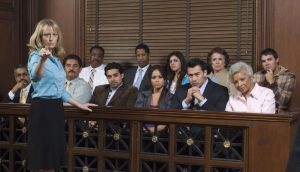
freedom in the English speaking world since 1215. This is not an attack on the jury system. It is merely a reflection as to why in false arrest, unreasonable force and malicious prosecution cases, The way that a jury decides these type of cases is as much political, as it is an exercise in fact finding. The persons who ultimately get to sit on juries in these cases, have no real idea as to how police officers actually act, and have no idea how truly institutionally corrupt, police agencies really are when it comes to defending the County / City coffers and their and the politicians’ images.
In both civil and criminal cases, the parties have some say in the composition of the jury. The jury pool are supposedly called randomly, and the Court and the lawyers get to ask them questions. That part of a trial, questioning potential jurors, is called voir dire, that in French means, to speak the truth. Each side gets a certain numbers of peremptory challenges, that they can use to strike persons from sitting as jurors. In a federal court civil rights case, each side usually gets four peremptory challenges. So far, sounds fair. Here’s the rub.
Most people who have actually seen police officers beat-up a civilian have a lasting terrible feeling about police misconduct. Almost invariably, when they are asked by the lawyers or the Court about whether their prior experience with police misconduct will cause them to be prejudice against either side, they almost always say Yes. Most such people who have seen police beatings and the false prosecutions of their friends, are so deeply affected, that they invariably tell the Court that they are biased against police officers (in this type of case), and that they cant really put-aside that bias and be completely fair and impartial. Once they make that statement, any such jurors are then routinely excused for cause from sitting on that jury. Thus, the jurors who would more likely be favorable to the civil rights plaintiff (or criminal defendant accused of some crime against a peace officer), is excused for cause from sitting on the jury. The lawyer defending the case for the police doesn’t even had to use one of their jury peremptory challenges to get rid of that juror. All of the others jurors who do get to sit, are people who have never seen police misconduct; leaving a jury that, unfortunately, have no concept of the way that police, and police organizations, actually act.
Therefore, when Miss, Mrs. or Mr. Citizen gets falsely arrested, beaten-up or maliciously prosecuted by police agencies, and gets criminally prosecuted for conduct that often isn’t criminal (i.e. “creative use” of the California criminal statute Penal Code Section 148(a)(1)), these “sanitized jurors” will generally not believe that the police really did what Miss, Mrs. or Mr. Citizen claim that they did, unless Miss, Mrs. or Mr. Citizen’s attorney can really prove otherwise; real proof; like a video, audio, or a bus load of highly observant nuns with photographic memories who testified about clearly indefensible police conduct. That’s why the jury system rigged against persons victimized by the police; because the only people who ever get to sit in judgment in these type of cases as jurors, are persons who have never had a bad experience with a police officer, or and who has not seen outrageous police conduct. Their life experience tells them something that’s just not true; that police officer don’t beat people up unless they did something to deserve it. You, therefore, need great proof to dispel that belief by jurors.
WHY THE COPS CAN GET USUALLY GET AWAY WITH IT; AS A PRACTICAL MATTER, WE LIVE IN A POLICE STATE.
If you think, as a practical matter, that you live in a free country, you’re wrong. We live in a police state; at least to a very appreciable degree. As a practical matter, the police can do whatever they want to you, and then procure the institution of a bogus criminal case against you. They typically author bogus police reports that claim that you committed some crime, like resisting / obstructing / delaying a peace officer (Cal. Penal Code § 148(a)(1)) and/or battery on a peace officer (Cal. Penal Code § 242 / 243(b)), that results in a bogus criminal prosecution against you. They know that the District Attorney’s Office takes great pride in protecting the police from civil liability, by filing and prosecuting criminal action. They do this to beat you down; to make it so expensive for you to defend yourself on bogus criminal charges that carry little chance of actually being sentenced to jail, such as resisting arrest, that you end-up taking a plea bargain, that, in practical effect, bars your lawsuit by you for either false arrest, malicious prosecution, and, in most such cases, unreasonable force.
They also do this to protect themselves from internal discipline, and criminal liability for civil rights violations (18 U.S.C. § 242; violating a persons federal Constitutional rights under the color of state law.) The employing police agency will (almost) always deny that their officer engaged in wrongful conduct, especially in swearing contest type cases, where there is no video recording of the police beatings. Because the employing police agency will (almost) always back their officers by touting their (false) version of the story in order to avoid civil liability to the employing entity for the actions of their officers, it’s almost impossible to discipline them. For example, the City of Inglewood, California, fired Inglewood Police Department officer Jeremy Morse, for the video recording beating of a teenager at a gas station. When it came time for the civil suit against the City and the officers for the beating, the City contended that the officers acted properly. Accordingly, since the City took that position, fired officer Jeremy Morse sued the city, and won $21600,000.00 for his wrongful firing.
In 2012, a retired LA Sheriff’s Department Captain, Bob Olmsted, told the LA Times, that the L.A. County Men’s Central Jail was, essentially, a torture chamber, run by these rogue jailer gangs of sadistic sociopaths (Minnesota Viking logo tattoos on on their ankles.) Discipline for beatings was not existent, and torturing inmates was actually required for jailer gang initiation. See, “L.A. County sheriff’s official tells of jail brutality”, LA Times, July 7, 2012. See also, “L.A. County jail violence sheriff’s fault, panel says”, LA Times, September 28, 2012. Rival Sheriff’s Department jailer gangs even got into a rumble between the “3000 Boys” (the third floor jailers) and the “2000 Boys” (the second floor jailers) at a Sheriff’s Department Christmas party.
Even as long ago as 1992, the Ninth Circuit Court of Appeals held in a published decision that the “Vikings” gang of Deputy Sheriff’s at the Lynwood Sheriff’s Station, that they were a Neo-Nazi white supremacist gang within the LA County Sheriff’s Department. See, Thomas v. County of Los Angeles, et al., 978 F.2d 504 (1992.)
Following Captain Bob Olmsted’s revelations to the FBI, the FBI did an undercover investigation at the LA County Men’s Central Jail. The FBI investigation resulted in the Indictment of 18 Deputy Sheriffs and their Supervisors for torturing inmates and obstructing the FBI’s investigation by hiding prisoners in the county jail population. These 18 Indictments of LA County Sheriff’s Department personnel resulted in the resignation of L.A. County Sheriff Lee Baca.
Former Undersheriff Paul Tanaka, along with a retired LASD Captain, were indicted on May 13, 2015 by a federal Grand Jury for Obstructing and Conspiring to Obstruct a federal Grand Jury investigation of the rampant torturing of inmates at the LA County Jail (See, Paul Tanaka Indictment of May 13, 2015.) That’s not the end of it. Former LASD Deputy Sheriff Noel Womack pleaded guilty in June of 2015 to federal charges of lying to the FBI about systemic LASD torturing and framing of inmates at the LA County Jails. In 2014, six LASD Deputy Sheriffs were convicted of obstructing the FBI’s investigation of the torturing of prisoners at the LA County Jails.
Lee Baca resigned from office over the scandal at the LA County Men’s Central Jail involving the Indictment of 18 LASD Deputy Sheriffs and their Supervisors for torturing prisoners and obstructing the FBI’s investigation of the same. On February 10, 2016, Sheriff Baca was Indicted for violation of 18 U.S.C. § 1001(a)(2); lying to the FBI regarding his knowledge of a scheme in the Sheriff’s Department to intimidate an FBI agent who was investigating complaints of beatings of inmates by deputies at the Los Angeles County Jail, and to hide an FBI informant – jail inmate from his FBI handlers. Sheriff Baca was tried on that Indictment, but the jury hung.

Thereafter, on April 6, 2016, former LASD Undersheriff Paul Tanaka was convicted of conspiracy and actual obstruction of an FBI investigation; violation of 18 U.S.C. § 371 (conspiring to obstruct justice) and 18 U.S.C. § 1503(a) (obstructing justice); for not only obstructing an FBI investigation into years of beatings and torturing of inmates at the L.A. County Jail, but also Tanaka and other high ranking Sheriff’s Department officials threatened one of the FBI agents involved in that investigation with arrest for continuing that investigation. In his trial, Tanaka admitted that he still had the Minnesota Vikings Logo tattoo on his leg; a tattoo that he described as a member in a club; the “Vikings”; a tatoo that the federal courts have held is the gang taoo for a “neo-Nazi white supremacists gang within the LA County Sheriff’s Department. See, Thomas v. County of Los Angeles, 978 F.2d 504 (1992).
Thereafter, on February 10, 2017, former LACounty Sheriff Lee Baca was convicted of similar

charges; lying to the FBI and obstruction of the FBI investigation into the systemic beatings and torture of inmates at the LA County Jail; violation of 18 U.S.C. § 1001(a)(2); lying to the FBI regarding his knowledge of a scheme in the Sheriff’s Department to intimidate an FBI agent who was investigating complaints of beatings of inmates by deputies at the LA County Jail, and to hide an FBI informant – jail inmate from his FBI handlers.
Nonetheless, the body politic tolerates the existence, and the perpetuation of an ongoing unwritten agreement among and between peace officers, to falsely report, and, if necessary, to thereafter conspire with officers who they may not yet even know, to falsely testify, about event(s), if the potential or apparent criminal, administrative and civil liability of a fellow officer is at stake. After all, in the primary category of cases that truly are “false arrests” in the most malevolent sense of the word, “Contempt of Cop cases“, the only reason that there’s an arrest of a civilian at all, is because the police officer has beaten-up / tortured another; usually to self-medicate rather their frail and easily bruise-able egos. If you’re reading this article, the odds are, that either you or a loved one or friend has been beaten-up by the police and are being criminally prosecuted for allegedly battering the officer or somehow “resisting” the officer.
OC, California had a Sheriff’s Department that was run by creepy Sheriff Mike Carona, who was released from federal prison in 2015 for witness tampering (instructing witness to lie to Grand Jury.) Until Sheriff Carona went to prison, OC was a fantasy assignment for those truly sadistic peace officers, who “get-off” on beating inmates and arrestees.
Nonetheless, the body politic tolerates the existence, and the perpetuation of an ongoing unwritten agreement among and between peace officers, to falsely report, and, if necessary, to thereafter conspire with officers who they may not yet even know, to falsely testify, about event(s), if the potential or apparent criminal, administrative and civil liability of a fellow officer is at stake. After all, in the primary category of cases that truly are “false arrests” in the most malevolent sense of the word, “Contempt of Cop cases“, the only reason that there’s an arrest of a civilian at all, is because the police officer has beaten-up / tortured another; usually to self-medicate rather their frail and easily bruise-able egos. If you’re reading this article, the odds are, that either you or a loved one or friend has been beaten-up by the police and are being criminally prosecuted for allegedly battering the officer or somehow “resisting” the officer.
Thus, at least as a practical matter, we live in a police state, because the police can, in the real world, do whatever they want to do to you, and almost always get away with it, so long as the activity is duty related, and could, if proven, expose the employing agency / entity to civil liability, political ridicule, or obloquy. True, the police have to justify their outrages, both internally (i.e. internal affairs investigations) and externally (bogus criminal prosecutions and defense of civil actions). But the system is rigged to permit them to do so; especially the jury system.
FALSE ARREST CASES – DON’T CALL THE COPS UNLESS YOU WANT SOMEONE AT LEAST IN JAIL, OR VERY POSSIBLY DEAD
All of use have broken some sort of law, but most of us don’t go around holding-up liquor stores. The odds are, that if you are inquiring about a police misconduct case, such as a false arrest case, that you fall into three basic categories of ways that the police came into contact with you, and then falsely arrested you, or worse.
I CALLED THE POLICE TO PROTECT ME, SO WHY WAS I THE ONE WHO WAS BEATEN-UP AND ARRESTED?
A frequent type of case in which the police falsely arrest an innocent person, is when you, your spouse, your lover, or your parent or child, call the police. Many times family members feel that they cannot control mentally ill (or mad or drunk / drugged-up) people, including and especially their relatives, so they call “911″; often believing that the ambulance and paramedics are going to come to actually help them. They may not have even thought that the police would be the responding agency, but when they find out that the police are there, trouble may be awaiting. Once the cops are on the scene, they are taught to take charge, and anyone challenging, or even questioning, the police giving orders or their authority to do so, even seemingly unreasonable ones, is going to either get physically abused by the police, or falsely arrested by the police, or both.
Also, many spouses or lovers call the police on each other, to get the other person out of the house; even for a night or two. The police are not there to solve your family problems, so when you make that call, don’t make it unless you want your spouse or lover to go to jail, or worse. Cops are not counselors. They take people to jail. That’s what they do. So remember, when you call the police on your parent, child, lover or spouse, the person who ends-up getting thumped and arrested by the police just may be you. “No” you say? The police won’t arrest me if I’m the party calling the police. You’re wrong. They don’t care who called. All that the seem to care about, is how you respond to them; regardless of how unreasonable they act. If then, they thump you and beat you up, the odds are, that the police won’t even investigate the subject matter that you called about. Now, all of their attention is on you, since they violated you.
Also, do not use the police to get a border or a family member out of your house, unless the person is posing a “real” threat of imminent serious physical harm. If it’s that bad that you can’t stay in the house, then leave and get a hotel room, or just leave. The police cannot summarily evict / eject a civilian from a home in which they reside; whether they’re on the lease or not. In California, if a person resides at a home, only a Judge can force them to leave; either in the form of: 1) a Writ of Possession (the Court Order that the landlord gets in an “unlawful detainer” action, to give to the Sheriff’s Department, to eject you from your home, when you don’t pay your rent); 2) a Civil Harassment Restraining Order (under Cal. Civ. Proc. Code § 527.6); 3) a Domestic Violence Restraining Order (under Cal. Family Code § 6320), and 4) an Emergency Protective Order in a criminal case (pursuant to Cal. Penal Code § 136.2.)
Contempt Of Cop Cases– A Frequent Reason For False Arrests By Police Officers.
“Contempt Of Cop“ cases, are bogus criminal actions, brought against innocents by criminal prosecutors, for essentially, “bruised ego“ violations. The “ego bruising”, is really nothing more than a civilian not immediately, and without protest or question, getting-down on the ground in a proned position, or not doing something that the officer wants you to do (lawful, reasonable or not) immediately, and without question or protest. The Constable‘s “ego” is typically “bruised”, by your conduct, such as: 1) asserting your Constitutional rights, or 2) claiming knowledge of them, or 3) asking the Constable why you’re being ordered to lie down on the ground while your chest is being illuminated by the red spot of a pistol or rifle targeting device; 4) telling the Constable that you have a medical condition that makes it difficult or painful to get on the ground; 5) telling the Constable that he can’t do something (i.e. can’t go in my house without a warrant; you can’t make me go inside or come outside); 6) failing to consent to an entry or a search; and 7) not exiting your house when ordered to do so (even though the police generally can’t order you to exit a private residence; save probable cause to arrest for serious dangerous felony, coupled with an emergency; See, United States v. Al-Azzawy, 784 F.2d 890 (9th Cir. 1985) and Elder v. Holloway, 510 U.S. 510 (1994.) These are but a few examples. The list is endless, but the theme is the same. Failing to immediately do whatever the police tell you to do, without protest, challenge or remarks, often will result in your being beaten-up, falsely arrested, and maliciously criminally prosecuted.
These, “Contempt Of Cop” cases, typical involve the police using force upon persons (i.e. beating them) and/or falsely arresting them, and then inventing bogus allegations of violations various “Contempt Of Cop” statutes, such as violations of: 1) Cal. Penal Code § 148(a)(1) (resisting / obstructing / delaying peace officer [commonly called “resisting arrest”]; the most abused statute in the Penal Code; 2) Cal. Penal Code § 240 /241(b) (assault on a peace officer); 3) Cal. Penal Code § 242 / 243(b) (battery on a peace officer); and 4) Cal. Penal Code 69 (interfering with public officer via actual or threatened use of force or violence.) Cal. Penal Code § 69 is a “wobbler”; a California public offense that may be filed by the District Attorney’s Office as either a felony or a misdemeanor. In OC, RS County and LA County, allegations of violation of Penal Code § 69 are usually filed as misdemeanors. In SB County, however, allegations of violation of Cal. Penal Code § 69 are filed as felonies much more often than her sister counties. If they shoot you, they may even charge you with Cal. Penal § Code 245(d); assault on a peace officer in a manner likely to result in great bodily injury.
III. Police Incompetence: A Frequent Reason For False Arrests By Police Officers.
Believe it or not, most experienced police officers have a pretty good functional understanding of very basic fourth amendment search and seizure issues. For example, police training about basic street contacts with civilians includes the following:
- Detentions of persons outside of the home;
- Arrests of persons outside of the home;
- The use of force on persons outside of the home;
- Probation searches
- Parole searches
- Search warrants
- Warrantless searches of persons, vehicles and homes
Once you get past the basics, most police officers really don’t understand what the Constitution forbids them from doing. Police officers simply are not sufficiently trained to properly act within with long established Constitutional constraints on them. It takes years for lawyers and judges to understand fourth amendment search and seizure issues, and they disagree often about whether certain conduct is, or is not, constitutional.
Moreover, just like the rest of us, the cops make mistakes all of the time. They are human, and, therefore, false arrests by police officers are almost very often the product of either sheer incompetence (i.e. the police arrest another for conduct that isn’t criminal), or of the police officer attempting to justify his unlawful conduct, by arresting and then framing their victim (i.e. false police reports, perjurious court testimony, false convictions) of his federal criminal (18 U.S.C. § 242), and otherwise tortious misconduct (i.e. if the police use unreasonable / unlawful force on a civilian, the use of force is almost always followed by a false arrest.)
FALSE ARREST CASES; CALIFORNIA LAW
FALSE ARREST BY PEACE OFFICER – ELEMENTS AND PROOF – CALIFORNIA LAW
A “false arrest” is the same “tort” as a “false imprisonment” under California law. Unlike federal law, under California law, the burden is on the police to justify their “seizure” (false arrest / false imprisonment) of you at a civil trial (See, California Civil Jury Instructions (“CACI”) 1401 [False Arrest by Peace Officer Without Warrant] and 1402 [Peace Officer’s Justification / Defense To Claim Of False Arrest].) Under California law, a peace officer (i.e. police officer or deputy sheriff) may arrest another for a felony for which the officer has “probable cause” to believe person committed, or may arrest another for a misdemeanor that was committed in their presence (See, Cal. Penal Code § 836.) “Presence is not mere physical proximity but is determined by whether the offense is apparent to the officers senses. People v. Sjosten, 262 Cal.App.2d 539, 543544 (1968″.) An officer can arrest a civilian, upon probable cause, for any felony; committed in the presence of an officer or not. Cal. Penal Code § 836. However, it does not violate the fourth amendment, for an officer to arrest for a misdemeanor that was committed outside of the presence of the officer.
FALSE ARREST BY PEACE OFFICER – NO “QUASI-QUALIFIED IMMUNITY” – CALIFORNIA LAW
Cal. Penal Code 847(b) provides:
“There shall be no civil liability on the part of, and no cause of action shall arise against, any peace officer . . . acting within the scope of his or her authority, for false arrest or false imprisonment arising out of any arrest under any of the following circumstances:
(1) The arrest was lawful, or the peace officer, at the time of the arrest, had reasonable cause to believe the arrest was lawful.”
Although police civil defendants have argued that Section 847(b)(1) immunizes peace officers for false arrests like the “qualified immunity“ provided for police false arrest civil defendants federal court, that code section cannot be reasonably construed that way. The first part of Section 47(b)(1) (“The arrest was lawful”), logically changes nothing, for if the arrest was lawful, then there is no liability under anyone’s theory; kind an unintended legal redundancy. The second part of Section 47(b)(1) (“the peace officer, at the time of the arrest, had reasonable cause to believe the arrest was lawful”), could only reasonably be meant to apply to a situation, where an officer arrested a civilian based upon either: 1) an arrest warrant that did issue, but for which there was no probable cause to have issued (the officer who obtained the arrest warrant on insufficient grounds committed the fourth amendment violation, and is liable for the false arrest, unless otherwise protected, such as by “qualified immunity“), or 2) when the officer had “reasonable cause”, which is essentially a term equivalent to “probable cause” under the jury instructions that are used at the trial of this particular tort (See, CACI 1402; . . . arrest lawful if . . . “reasonable cause to believe that the plaintiff committed a crime“ is the standard for whether a peace officer’s arrest of a civilian was lawful.) Therefore, logically, Section 47(b)(1) provides no immunity for California peace officers for a false arrest. That does not mean, however, that a state or federal judge won’t disagree with that proposition. It is not fully developed under either California law, or by the federal district court’s interpretation of that statute.
FALSE ARREST BY PEACE OFFICER – FEDERAL LAW – GENERALLY
A “false arrest” under federal law, is considered a violation of a person’s right to be free from an “unreasonable seizure” of their person under the Fourth Amendment (See, Ninth Circuit Court of Appeals Model Civil Jury Instruction for Arrest Without Probable Cause Or Warrant.) The United States Supreme Court has defined a “seizure of a person” as when a reasonable person would not feel free to leave the presence of police officers and to go about their business. See, United States v. Mendenhall, 446 U.S. 544 (1980.)
In 1871, Congress enacted the Ku Klux Klan Act (42 U.S.C. § 1983), that gives any person whose federal Constitutional rights have been violated, a right to sue, any person who violated those rights under the color of state law, in a United States District Court. Section 1983 lawsuits can also be brought in a state court of general jurisdiction; See, 42 U.S.C. § 1988. Accordingly, a person who is falsely arrested by a peace officer (i.e. police officer, deputy sheriff, or some other officer who derives peace officer powers from state law), may sue the police officer under Section 1983, as well as under California state law.
In federal court, in a civil Fourth Amendment “arrest without probable cause” case (a federal false arrest case), the jury is instructed at the end of the case, on the following definition of “probable cause”:
“Probable cause exists when, under all of the circumstances known to the officer[s] at the time, an objectively reasonable police officer would conclude there is a fair probability that the plaintiff has committed or was committing a crime” (See, Ninth Circuit Court of Appeals Model Civil Jury Instruction 9.20, Arrest Without Probable Cause Or Warrant.)
Therefore, that standard, whether “an objectively reasonable police officer would conclude there is a “fair probability” that the plaintiff has committed or was committing a crime”, is the standard that the propriety of an arrest, outside of the home is judged by, in federal court in the states comprising the Ninth Circuit Court of Appeals (Ninth Circuit Model Civil Jury Instruction 9.20). It doesn’t matter what the thousands of other cases, from the Supreme Court on down, say about what “probable cause” means. All that matters, is what a civil jury is going to be told is the standard that they should judge the facts by, in their deliberations (a civil jury is the “Judge of the facts” trier of fact, and the District Judge is the “Judge of the law”.)
Some justices say that the words “probable cause“, are found in the text of the fourth amendment itself, and that is the standard for a seizure of a person by the government that was established by the Founding Fathers at the Constitutional Convention in Philadelphia in 1791; not reasonable suspicion:

“MR. JUSTICE DOUGLAS, dissenting.
I agree that petitioner was “seized” within the meaning of the Fourth Amendment. I also agree that frisking petitioner and his companions for guns was a “search.” But it is a mystery how that “search” and that “seizure” can be constitutional by Fourth Amendment standards unless there was “probable cause” [n1] to believe that (1) a crime had been committed or (2) a crime was in the process of being committed or (3) a crime was about to be committed.
The opinion of the Court disclaims the existence of “probable cause.” If loitering were in issue and that [p36] was the offense charged, there would be “probable cause” shown. But the crime here is carrying concealed weapons; [n2] and there is no basis for concluding that the officer had “probable cause” for believing that that crime was being committed. Had a warrant been sought, a magistrate would, therefore, have been unauthorized to issue one, for he can act only if there is a showing of “probable cause.” We hold today that the police have greater authority to make a “seizure” and conduct a “search” than a judge has to authorize such action. We have said precisely the opposite over and over again. [n3] [p37]
In other words, police officers up to today have been permitted to effect arrests or searches without warrants only when the facts within their personal knowledge would satisfy the constitutional standard of probable cause. At the time of their “seizure” without a warrant, they must possess facts concerning the person arrested that would have satisfied a magistrate that “probable cause” was indeed present. The term “probable cause” rings a bell of certainty that is not sounded by phrases such as “reasonable suspicion.” Moreover, the meaning of “probable cause” is deeply imbedded in our constitutional history. As we stated in Henry v. United States, 361 U.S. 98, 100-102:
The requirement of probable cause has roots that are deep in our history. The general warrant, in which the name of the person to be arrested was left blank, and the writs of assistance, against which James Otis inveighed, both perpetuated the oppressive practice of allowing the police to arrest and search on suspicion. Police control took the place of judicial control, since no showing of “probable cause” before a magistrate was required.
That philosophy [rebelling against these practices] later was reflected in the Fourth Amendment. And as the early American decisions both before and immediately after its adoption show, common rumor or report, suspicion, or even “strong reason to suspect” was not adequate to support a warrant [p38] for arrest. And that principle has survived to this day. . . .
. . . It is important, we think, that this requirement [of probable cause] be strictly enforced, for the standard set by the Constitution protects both the officer and the citizen. If the officer acts with probable cause, he is protected even though it turns out that the citizen is innocent. . . . And while a search without a warrant is, within limits, permissible if incident to a lawful arrest, if an arrest without a warrant is to support an incidental search, it must be made with probable cause. . . . This immunity of officers cannot fairly be enlarged without jeopardizing the privacy or security of the citizen.
The infringement on personal liberty of any “seizure” of a person can only be “reasonable” under the Fourth Amendment if we require the police to possess “probable cause” before they seize him. Only that line draws a meaningful distinction between an officer’s mere inkling and the presence of facts within the officer’s personal knowledge which would convince a reasonable man that the person seized has committed, is committing, or is about to commit a particular crime.
In dealing with probable cause, . . . as the very name implies, we deal with probabilities. These are not technical; they are the factual and practical considerations of everyday life on which reasonable and prudent men, not legal technicians, act. Brinegar v. United States, 338 U.S. 160, 175.
To give the police greater power than a magistrate is to take a long step down the totalitarian path. Perhaps such a step is desirable to cope with modern forms of lawlessness. But if it is taken, it should be the deliberate choice of the people through a constitutional amendment. [p39] Until the Fourth Amendment, which is closely allied with the Fifth, [n4] is rewritten, the person and the effects of the individual are beyond the reach of all government agencies until there are reasonable grounds to believe (probable cause) that a criminal venture has been launched or is about to be launched.
There have been powerful hydraulic pressures throughout our history that bear heavily on the Court to water down constitutional guarantees and give the police the upper hand. That hydraulic pressure has probably never been greater than it is today.
Yet if the individual is no longer to be sovereign, if the police can pick him up whenever they do not like the cut of his jib, if they can “seize” and “search” him in their discretion, we enter a new regime. The decision to enter it should be made only after a full debate by the people of this country.” Terry v. Ohio, 392 U.S. 1 (1968) Douglas,J. Dissenting.
Moreover, it does not matter what the arresting officer’s state of mind was, even if he was mistaken as to the crime committed, so long as in retrospect, a reasonably well trained officer would have believed that there was a “fair probability” that you committed a crime.
THE CLOSELY RELATED OFFENSE DOCTRINE; A REASONABLE BUT NOW EXTINCT APPROACH TO WHETHER CIVIL LIABILITY ATTACHES TO AN ARREST.
The Ninth Circuit Court of Appeals used to employ a doctrine entitled the “Closely Related Offense Doctrine.” Under that doctrine, if an officer arrested a civilian for one particular crime, but the police officer didn’t have probable cause to have arrested the person was for that crime, if a reasonably well trained officer would have believed that probable cause existed to have arrested the person for some other crime that was “closely related” to the crime that the person was arrested for, then the arrest is valid under the “Closely Related Offense Doctrine.” Bingham v City of Manhattan Beach, 341 F.3d 939 (9th Cir. 2003.) However, the “Closely Related Offense Doctrine” was overruled by the U.S. Supreme Court in Devenpeck v. Alford, 543 U.S. 146 (2004.)
“Our cases make clear that an arresting officers state of mind (except for the facts that he knows) is irrelevant to the existence of probable cause. . . . That is to say, his subjective reason for making the arrest need not be the criminal offense as to which the known facts provide probable cause. As we have repeatedly explained, the fact that the officer does not have the state of mind which is hypothecated by the reasons which provide the legal justification for the officer’s action does not invalidate the action taken as long as the circumstances, viewed objectively, justify that action. . .. [T]he Fourth Amendments concern with reasonableness allows certain actions to be taken in certain circumstances, whatever the subjective intent.” See, Devenpeck v. Alford, 543 U.S. 146, 15253 (2004.)
Accordingly, the arresting police officers belief about what crime a person committed is irrelevant. All that matters is whether a reasonably well trained officer would have entertained a belief that the person arrested committed a crime; that is, the “reasonably well trained officer” in the abstract. If that fictional “reasonably well trained police officer” would not have believed that a crime had been committed, the arrested person may be able to obtain compensation for his/her false arrest.
Many times an officer mistakenly believes that certain conduct is a crime, but it’s not (See, Tab above for “Police Misconduct News“, and the Section therein entitled “Possum Impossible”; the Lorenzo Oliver case; Ninth Circuit Court of Appeals holds that, as matter of law, no crime committed.) Other times, an officer arrests a person for a crime that he has no warrant or probable cause for, but, under the facts as the officer knew them, there was nonetheless a crime committed, that would have been apparent to the officer is he was familiar with that particular criminal statute. So long as a reasonably well trained officer would have believed that probable cause existed from the facts known to the arresting officer, the arrest is generally lawful. See, Devenpeck v. Alford, 543 U.S. 146, 15253 (2004.)
ATWATER LEGALIZES OTHERWISE FALSE ARRESTS.
If a police officer arrests you for any violation of law, even a parking ticket or a seat-belt violation, actually taking you to jail and booking you does not violate the Fourth Amendment; at least since 2001. See, Atwater v. City of Lago Vista, 532 U.S. 318 (2001) (arrest for violation of Texas seat-belt statute that carries a maximum $50.00 fine and no jail, not violative of the Fourth Amendment’s prohibition against “unreasonable searches and seizures”.)(See also, however, stinging Dissent by Justice O’Connor in Atwater:
“Such unbounded discretion [to arrest for even the most trivial offense] carries with it grave

potential for abuse. The majority takes comfort in the lack of evidence of an epidemic of unnecessary minor-offense arrests. Ante, at 33, and n. 25. But the relatively small number of published cases dealing with such arrests proves little and should provide little solace. Indeed, as the recent debate over racial profiling demonstrates all too clearly, a relatively minor traffic infraction may often serve as an excuse for stopping and harassing an individual. After today, the arsenal available to any officer extends to a full arrest and the searches permissible concomitant to that arrest. An officers subjective motivations for making a traffic stop are not relevant considerations in determining the reasonableness of the stop. See, Whren v. United States, supra, at 813. But it is precisely because these motivations are beyond our purview that we must vigilantly ensure that officers post stop actions which are properly within our reach comport with the Fourth Amendments guarantee of reasonableness . . . . The Court neglects the Fourth Amendments express command in the name of administrative ease. In so doing, it cloaks the pointless indignity that Gail Atwater suffered with the mantle of reasonableness. I respectfully dissent.” Atwater v. City of Lago Vista, 532 U.S. 318 (2001) O’Connor, J., Dissenting.
FALSE ARREST BY PEACE OFFICER – FEDERAL LAW – QUALIFIED IMMUNITY
Under the Qualified Immunity Doctrine, so long as a reasonably well trained officer could have believed that a person’s conduct constituted a crime, the officer who actually violated the Constitutional rights of another is nonetheless immune from being liable for damages caused by the officer’s Constitutional violation:
“The qualified immunity analysis involves two separate steps. First, the court determines whether the facts show the officers conduct violated a constitutional right. Saucier v. Katz, 533 U.S. 194, 201 (2001). If the alleged conduct did not violate a constitutional right, then the defendants are entitled to immunity and the claim must be dismissed. However, if the alleged conduct did violate such a right, then the court must determine whether the right was clearly established at the time of the alleged unlawful action. Id. A right is clearly established if a reasonable official would understand that what he is doing violates that right. Id. at 202. If the right is not clearly established, then the officer is entitled to qualified immunity. While the order in which these questions are addressed is left to the courts sound discretion, it is often beneficial to perform the analysis in the sequence outlined above. Pearson v. Callahan, 129 S.Ct. 808, 818 (2009). Of course, where a claim of qualified immunity is to be denied, both questions must be answered.” Hopkins v. Bonvicino, 573 F.3d 752 (9th Cir. 2009.)
These days, qualified immunity for false arrests are so common, that they almost make false arrest cases impossible to win.
WHAT YOU CAN DO
Someone has to stand-up to the bullies of society, who think that using state police power to humiliate others, is funny, and makes them big men (or women.) There are thousands of others like you, who are good people, and have been somehow, for some reason that you could not have ever imagined, victimized by the government. It might as well be you. Stand-up for justice. Stand-up for our form of self-government. Stand-up for the spilled-blood of our fathers, who bravery died to prevent the very thing, that the government is doing to you right now.
Click on “Home”, above, or the other pages shown, for the information or assistance that we can provide for you. If you need to speak with a lawyer about your particular legal situation, please call the Law Offices of Jerry L. Steering for a free telephone consultation. Also, if you have been the victim of a False Arrest or Excessive Force by a police officer, check our Section, above, entitled: “What To Do If You Have Been Beaten-Up Or False Arrested By The Police“.
Thank you, and best of luck, whatever your needs.
Law Offices of Jerry L. Steering
Jerry L. Steering, Esq.

